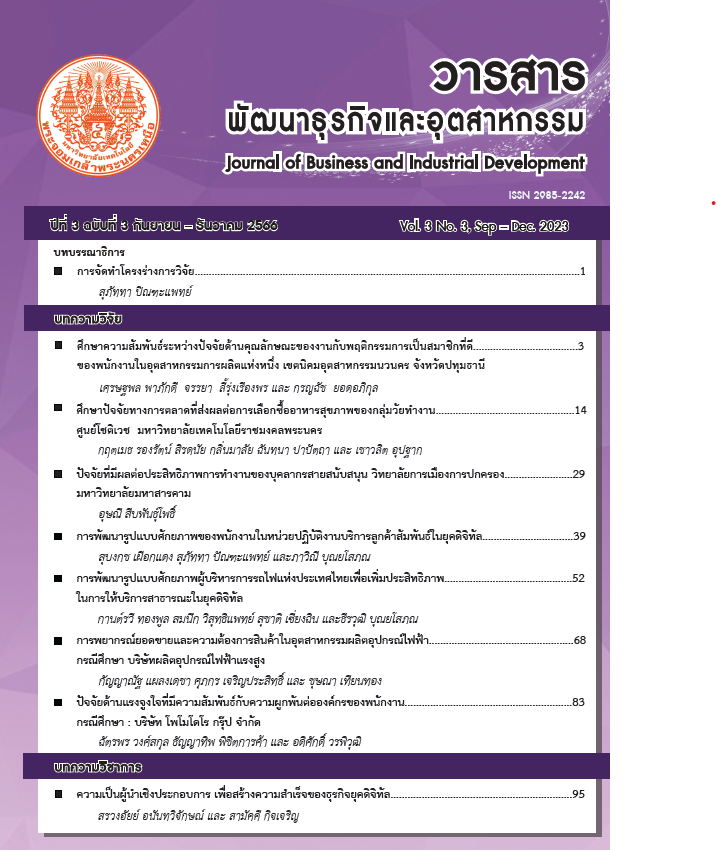The Relationship between Job Attributes and the Organizational Citizenship Behavior in Navanakorn Industrial Estate, Pathum Thani Province
Keywords:
Job attributes, Employees, Organizational Citizenship BehaviorAbstract
This research aimed to study 1) the level of the perceived job attribute factors, 2) the organizational citizenship behavior of the employees, and 3) the relationship between the job attributes and the organizational citizenship behavior. This research used a quantitative approach. The population included employees in the manufacturing industries in the Navanakorn Industrial Estate, Pathum Thani Province, Using a simple random method; the sample size was 152 people. The research tool was a questionnaire. Data were analyzed by statistics, percentage, mean, and standard deviation and Pearson's Correlation. The results found that most respondents were females aged between 31-40 years old, having a diploma/high vocational education level and work period between 16-20 years. Employees perceived the factors related to job characteristics at a moderate level. The high level of perception were Cooperation at work. The rest were at a moderate level, arranged as follows: Challenging work, Freedom in working, Career advanced opportunity, Assigned work matched the abilities. Employees had the organizational citizenship behavior at a high level, arranged as followed: Diligence to work, Commitment to the organization, Confidence in the organization, being honest to the organization, having good attitudes towards working, and Pursuing knowledge about the job. The job attributes were correlated to the good citizenship behavior of employees in the organization with a statistically significant level at 0.05.
References
Shen, J., & ,et al. (2009). Managing Diversity through Human Resource Management: An International Perspective and Conceptual Framework. The International Journal of Human Resource Management. 20(2): 235–251.
Sekiguchi, T. (2013). Theoretical Implications from The Case of Performance Based Human Resource Management Practices in Japan: Management Fashion, Institutionalization and Strategic Human Resource Management Perspectives. The International Journal of Human Resource Management. 24(3), 471–486. (in Thai).
Pinthaphaet, S. (2022). Human Behavior in Industrial Business Organizations. [Unpublished Master’s thesis]. King Mongkut's University of Technology North Bangkok. (in Thai).
Ann Marie, R., Opland, A., Richard, & Jensen, Jaclyn M. (2010). Psychological Contracts and Counterproductive Work Behaviors: Employee Responses to Transactional and Relational Breach. Journal of Business and Psychology, 25, 555–568.
Suchanan, S. (November 22, 2022). Have You Ever Wondered What The Meaning Of 'Good Work' Is?. Techsauce. https://techsauce.co/connext/get-a-job/have-you-ever-considered-what-it-means-to-have-a-good-job. (in Thai).
Sinjaru, T. (2007). Research and statistical data analysis with SPSS. Bangkok: We Inter Print. (in Thai).
Pitaloka, Endang, Paramita, Irma Sofia. (2014). An Effect of Work Environment, Job Satisfaction, Organization Commitment on OCB Of Internal Auditors. International Journal of Business, Economics and Law, 5(2), 10-18.
Baotham, S. (2012). Relationship Between Knowledge Development Professional Continuation Career Satisfaction and Career Success for Certified Public Accountants in Thailand. Academic Journal of the University of the Thai Chamber of Commerce, 32(1), 1–17. (in Thai).
Krongmonkol, V., & Akakulanan, S. (2012). Leadership, Organization Climate and Organizational, Citizenship Behaviors Affecting Job Performance of Goverment Official in One Goverment Agency. Journal of Social Sciences and Humanities, 38(1), 214-227. (in Thai).
Spector, P., Zhou, Z., & Che, X. (2014). Nurse Exposure to Physical and Nonphysical Violence, Bullying, and Sexual harassment: A Quantitative Review. International Journal of Nursing Studies, 51(1), 72-84.
Philip, M. Podsakoff, Scott, B. MacKenzie, Julie Beth Paine, & Daniel, G. Bachrach. (2000). Organizational Citizenship Behaviors: A Critical Review of the Theoretical and Empirical Literature and Suggestions for Future Research. Journal of Management, 26(3), https://doi.org/10.1177/014920630002600307.
Thaiwijit, D., & et al. (2012) Influence of Causal Factors Affecting Employee Performance of TOT Public Company Limited. Journal of Modern Management Science, 5(2). (in Thai).
Muangrung, S. (2009). Factors Relating to Organizational Loyalty: A Case of Airports of Thailand Public Company Limited. [Unpublished Master’s thesis]. Rajamangala University of Technology Thanyaburi. (in Thai).
Panthaphalangkun, P. (2012). Employee Engagement. Prakal's Blog: HR Knowledge Community. https://shorturl.at/hyCMP. (in Thai).
Downloads
Published
How to Cite
Issue
Section
License

This work is licensed under a Creative Commons Attribution-NonCommercial-NoDerivatives 4.0 International License.





